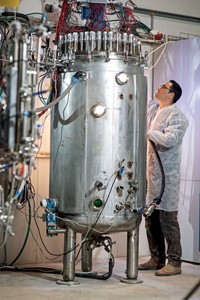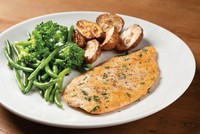Advertisement
Grab your lab coat. Let's get started
Welcome!
Welcome!
Create an account below to get 6 C&EN articles per month, receive newsletters and more - all free.
It seems this is your first time logging in online. Please enter the following information to continue.
As an ACS member you automatically get access to this site. All we need is few more details to create your reading experience.
Not you? Sign in with a different account.
Not you? Sign in with a different account.
ERROR 1
ERROR 1
ERROR 2
ERROR 2
ERROR 2
ERROR 2
ERROR 2
Password and Confirm password must match.
If you have an ACS member number, please enter it here so we can link this account to your membership. (optional)
ERROR 2
ACS values your privacy. By submitting your information, you are gaining access to C&EN and subscribing to our weekly newsletter. We use the information you provide to make your reading experience better, and we will never sell your data to third party members.
Business
Animal-free meat, dairy firms raise funds
Memphis Meats, Ripple Foods attract corporate and venture investors
by Melody M. Bomgardner
January 31, 2018
| A version of this story appeared in
Volume 96, Issue 6

Two start-ups selling different approaches to taking the animals out of animal food products attracted diverse backers last week. The more futuristic company, Memphis Meats, is developing meat and poultry products from animal cells raised in bioreactors. The more conventional firm, Ripple Foods, already has its new dairy replacements, which it makes from dried yellow peas, available for consumers at Whole Foods and other grocery stores.
Memphis Meats, which debuted its lab-grown chicken last year, has brought on as an investor the new venture arm of chicken behemoth Tyson Foods. Tyson CEO Tom Hayes acknowledged on the firm’s websitethat “it might seem counterintuitive” for a company like his to invest in so-called alternative proteins. But he explains that technical innovation is required to sustainably meet the growing world population’s need for protein and calories.
Tyson did not disclose the amount of its investment. Last year, Memphis raised $17 million in a first round of funding, led by venture capital firm Draper Fisher Jurvetson. Memphis Meats says it hopes to bring its products to market in 2021. But first it must lower production costs from about $20,000 per kg to a cost similar to regular chicken, which is around $7 per kg.
Ripple Foods raked in $65 million in its third round of funding from Euclidean Capital, a fund owned by hedge fund billionaire James Simons, along with Khosla Ventures, Goldman Sachs, and the food and agriculture-focused S2G Ventures.
Ripple hopes to stand out from plant-based rivals like almond milk by appealing to the health-conscious. The firm claims its pea-extraction technology results in products that can compete with cow’s milk for protein, but contain less sugar and don’t taste like peas.




Join the conversation
Contact the reporter
Submit a Letter to the Editor for publication
Engage with us on Twitter